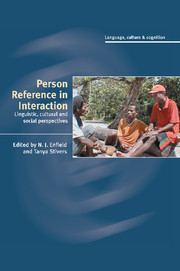Book contents
- Frontmatter
- Contents
- List of contributors
- Preface
- Acknowledgements
- 1 Person reference in interaction
- Part I Person reference as a system
- Part II The person reference system in operation
- 6 Conveying who you are: the presentation of self, strictly speaking
- 7 Person reference in Yucatec Maya conversation
- 8 Principles of person reference in Tzeltal conversation
- 9 The interactional meanings of quasi-pronouns in Korean conversation
- 10 Person reference in Tzotzil gossip: referring dupliciter
- Part III The person reference as a system in trouble
- References
- Index
9 - The interactional meanings of quasi-pronouns in Korean conversation
Published online by Cambridge University Press: 22 September 2009
- Frontmatter
- Contents
- List of contributors
- Preface
- Acknowledgements
- 1 Person reference in interaction
- Part I Person reference as a system
- Part II The person reference system in operation
- 6 Conveying who you are: the presentation of self, strictly speaking
- 7 Person reference in Yucatec Maya conversation
- 8 Principles of person reference in Tzeltal conversation
- 9 The interactional meanings of quasi-pronouns in Korean conversation
- 10 Person reference in Tzotzil gossip: referring dupliciter
- Part III The person reference as a system in trouble
- References
- Index
Summary
Introduction
In our daily lives, we often talk about ourselves, those whom we are talking to, and many other people that we know or even don't know. As evidenced by the chapters in this volume, speakers of any language have at their disposal an array of alternative forms that can be used for referring to people. What factors influence a speaker's choice of a particular form at a particular moment in interaction is therefore of great interest. The present chapter examines Korean speakers' practices of referring to persons using quasi-pronouns (i.e., nouns followed by a demonstrative akin to ‘this guy/girl’ in English). Quasi-pronouns are used very frequently in naturally-occurring conversations (typically as subsequent reference terms), but little is known about how, and for what interactional goals, parties to conversation utilize them. This chapter elucidates the interactional uses of quasi-pronouns in reference to third persons by focusing on the actions and activities that speakers are engaged in when they employ these forms. The discussion will focus on how two sub-types of quasi-pronouns (ku-based, and distal demonstrative ones and i-based, or proximal demonstrative ones) are distinguished in their usages and their functions. The separate use of the two can not only differentiate among referents (e.g., by marking the protagonist status of the referent) but also index participants' relative knowledge or epistemic authority on the referent as well.
- Type
- Chapter
- Information
- Person Reference in InteractionLinguistic, Cultural and Social Perspectives, pp. 203 - 225Publisher: Cambridge University PressPrint publication year: 2007
- 6
- Cited by

